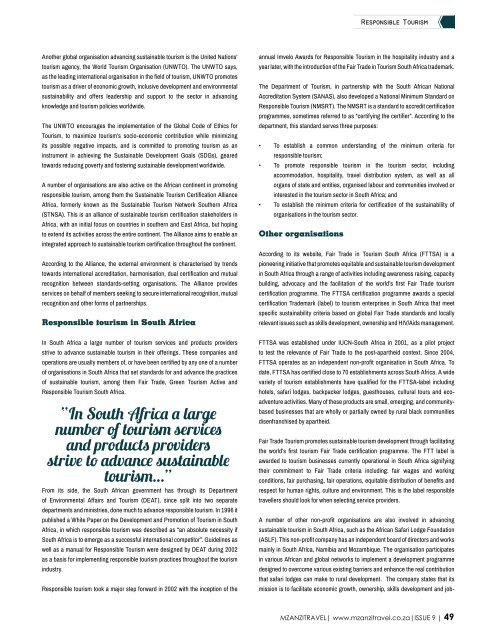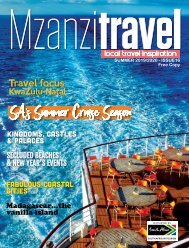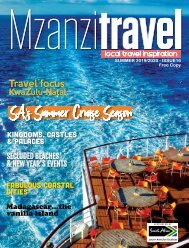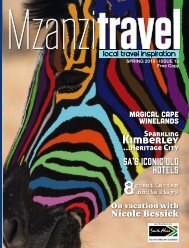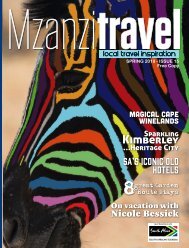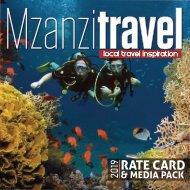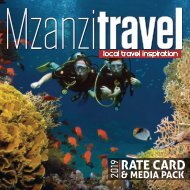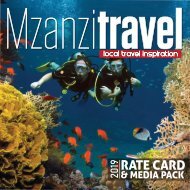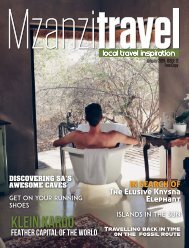Mzanzitravel Magazine - Issue 9
MzanziTravel Magazine is a local travel inspiration for tourists (local and international) to discover the best places to visit in Africa.
MzanziTravel Magazine is a local travel inspiration for tourists (local and international) to discover the best places to visit in Africa.
You also want an ePaper? Increase the reach of your titles
YUMPU automatically turns print PDFs into web optimized ePapers that Google loves.
Responsible Tourism<br />
Another global organisation advancing sustainable tourism is the United Nations’<br />
tourism agency, the World Tourism Organisation (UNWTO). The UNWTO says,<br />
as the leading international organisation in the field of tourism, UNWTO promotes<br />
tourism as a driver of economic growth, inclusive development and environmental<br />
sustainability and offers leadership and support to the sector in advancing<br />
knowledge and tourism policies worldwide.<br />
The UNWTO encourages the implementation of the Global Code of Ethics for<br />
Tourism, to maximize tourism’s socio-economic contribution while minimizing<br />
its possible negative impacts, and is committed to promoting tourism as an<br />
instrument in achieving the Sustainable Development Goals (SDGs), geared<br />
towards reducing poverty and fostering sustainable development worldwide.<br />
A number of organisations are also active on the African continent in promoting<br />
responsible tourism, among them the Sustainable Tourism Certification Alliance<br />
Africa, formerly known as the Sustainable Tourism Network Southern Africa<br />
(STNSA). This is an alliance of sustainable tourism certification stakeholders in<br />
Africa, with an initial focus on countries in southern and East Africa, but hoping<br />
to extend its activities across the entire continent. The Alliance aims to enable an<br />
integrated approach to sustainable tourism certification throughout the continent.<br />
According to the Alliance, the external environment is characterised by trends<br />
towards international accreditation, harmonisation, dual certification and mutual<br />
recognition between standards-setting organisations. The Alliance provides<br />
services on behalf of members seeking to secure international recognition, mutual<br />
recognition and other forms of partnerships.<br />
Responsible tourism in South Africa<br />
annual Imvelo Awards for Responsible Tourism in the hospitality industry and a<br />
year later, with the introduction of the Fair Trade in Tourism South Africa trademark.<br />
The Department of Tourism, in partnership with the South African National<br />
Accreditation System (SANAS), also developed a National Minimum Standard on<br />
Responsible Tourism (NMSRT). The NMSRT is a standard to accredit certification<br />
programmes, sometimes referred to as “certifying the certifier”. According to the<br />
department, this standard serves three purposes:<br />
• To establish a common understanding of the minimum criteria for<br />
responsible tourism;<br />
• To promote responsible tourism in the tourism sector, including<br />
accommodation, hospitality, travel distribution system, as well as all<br />
organs of state and entities, organised labour and communities involved or<br />
interested in the tourism sector in South Africa; and<br />
• To establish the minimum criteria for certification of the sustainability of<br />
organisations in the tourism sector.<br />
Other organisations<br />
According to its website, Fair Trade in Tourism South Africa (FTTSA) is a<br />
pioneering initiative that promotes equitable and sustainable tourism development<br />
in South Africa through a range of activities including awareness raising, capacity<br />
building, advocacy and the facilitation of the world’s first Fair Trade tourism<br />
certification programme. The FTTSA certification programme awards a special<br />
certification Trademark (label) to tourism enterprises in South Africa that meet<br />
specific sustainability criteria based on global Fair Trade standards and locally<br />
relevant issues such as skills development, ownership and HIV/Aids management.<br />
In South Africa a large number of tourism services and products providers<br />
strive to advance sustainable tourism in their offerings. These companies and<br />
operations are usually members of, or have been certified by any one of a number<br />
of organisations in South Africa that set standards for and advance the practices<br />
of sustainable tourism, among them Fair Trade, Green Tourism Active and<br />
Responsible Tourism South Africa.<br />
FTTSA was established under IUCN-South Africa in 2001, as a pilot project<br />
to test the relevance of Fair Trade to the post-apartheid context. Since 2004,<br />
FTTSA operates as an independent non-profit organisation in South Africa. To<br />
date, FTTSA has certified close to 70 establishments across South Africa. A wide<br />
variety of tourism establishments have qualified for the FTTSA-label including<br />
hotels, safari lodges, backpacker lodges, guesthouses, cultural tours and ecoadventure<br />
activities. Many of these products are small, emerging, and communitybased<br />
businesses that are wholly or partially owned by rural black communities<br />
disenfranchised by apartheid.<br />
From its side, the South African government has through its Department<br />
of Environmental Affairs and Tourism (DEAT), since split into two separate<br />
departments and ministries, done much to advance responsible tourism. In 1996 it<br />
published a White Paper on the Development and Promotion of Tourism in South<br />
Africa, in which responsible tourism was described as “an absolute necessity if<br />
South Africa is to emerge as a successful international competitor”. Guidelines as<br />
well as a manual for Responsible Tourism were designed by DEAT during 2002<br />
as a basis for implementing responsible tourism practices throughout the tourism<br />
industry.<br />
Responsible tourism took a major step forward in 2002 with the inception of the<br />
Fair Trade Tourism promotes sustainable tourism development through facilitating<br />
the world’s first tourism Fair Trade certification programme. The FTT label is<br />
awarded to tourism businesses currently operational in South Africa signifying<br />
their commitment to Fair Trade criteria including: fair wages and working<br />
conditions, fair purchasing, fair operations, equitable distribution of benefits and<br />
respect for human rights, culture and environment. This is the label responsible<br />
travellers should look for when selecting service providers.<br />
A number of other non-profit organisations are also involved in advancing<br />
sustainable tourism in South Africa, such as the African Safari Lodge Foundation<br />
(ASLF). This non-profit company has an independent board of directors and works<br />
mainly in South Africa, Namibia and Mozambique. The organisation participates<br />
in various African and global networks to implement a development programme<br />
designed to overcome various existing barriers and enhance the real contribution<br />
that safari lodges can make to rural development. The company states that its<br />
mission is to facilitate economic growth, ownership, skills development and job-<br />
MZANZITRAVEL| www.mzanzitravel.co.za|ISSUE 9 | 49


